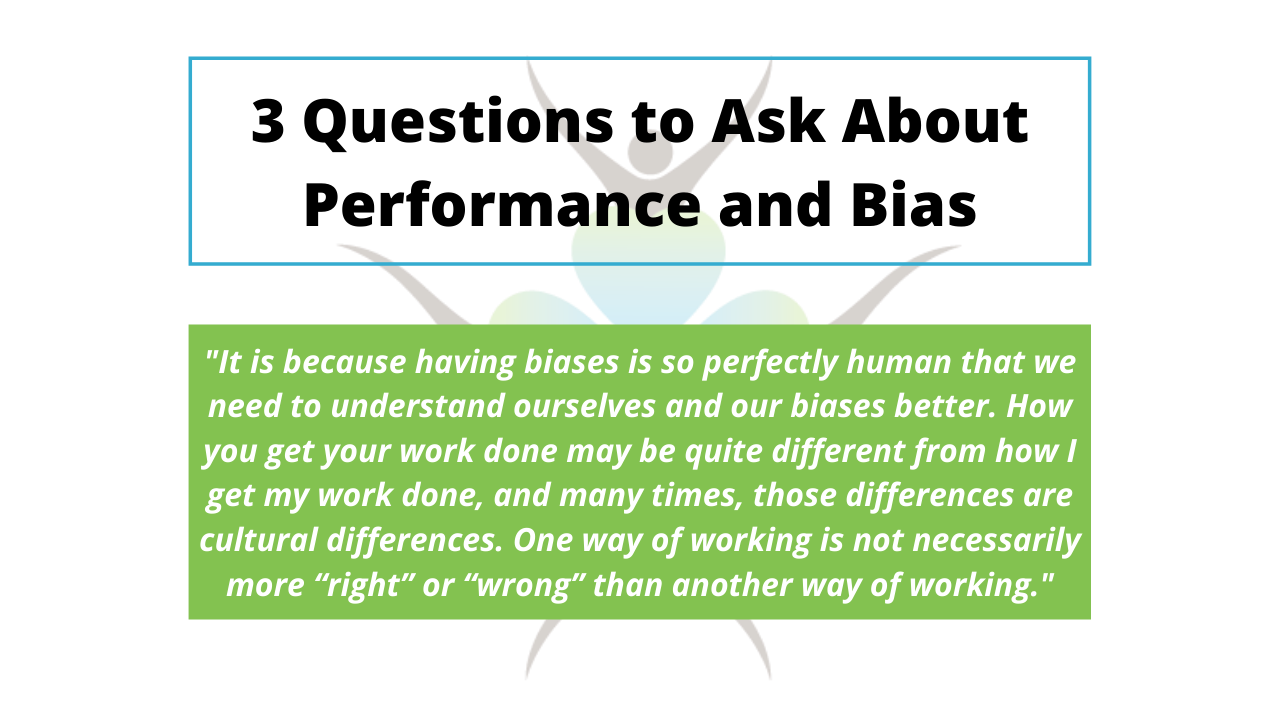
3 Questions to Ask About Performance and Bias
Mar 30, 2017In many of the classes I teach, we spend some time talking about biases. Biases in and of themselves are not bad things – we all have them. It’s part of the human condition. What we do with them, how we react when they come up, determines the “good” or “bad” part.
I often use a personal example in terms of performance management. For years, I was managed by a White American man who didn’t show much expression, especially in the workplace. Let me be clear, I liked him - he was a very supportive and encouraging manager. The thing was, every year, there would be something on my performance review under “Needs Improvement” about my emotions. It was worded differently every year, but I could count on it being there. In fact, after a few years, it got to be a little game trying to guess what words he would use to describe my emotions that year.
My question is this – Does showing emotions equate to a performance issue?
Answer? Maybe.
If I’m so crazed that I can’t get my work done, and people don’t want to be on my team, and those on my team leave because of me, absolutely, it’s a performance issue.
The thing is, I was a very successful project manager. I had leadership asking me to lead projects, I had my pick of people, and the people on my teams were engaged. No performance issue there.
A few years later, I transitioned to work for a Latino. Latinos tend to be a little more comfortable showing emotions than White Americans. Guess what showed up on my first performance review under “Strengths?”
It was my passion for my work!
Same me, and two different managers interpreting my emotions in two entirely different ways. Both were good guys, and I believe both had my best interests in mind. The thing is, they were running my performance through their own cultural filters, and putting a judgment on that. One had been very successful not showing emotions, the other had been very successful being more open with his emotions. Naturally, they thought the best way for me to be successful was to do what they had done.
We bring our biases every day, in so many ways, to the workplace – performance management, hiring decisions, promotion decisions, succession planning, team assignments.
It is because having biases is so perfectly human that we need to understand ourselves and our biases better. How you get your work done may be quite different from how I get my work done, and many times, those differences are cultural differences. One way of working is not necessarily more “right” or “wrong” than another way of working.
Ask yourself:
- Is a person's "fit" for your team or organization based on personality rather than skills?
- Are you determining performance based on work style instead of outcomes?
- Do you deteremine who's next in line for a promotion based on who has a leadership style that is most like yours?
If you answered, "Yes" to any of these questions, then biases are affecting your work. Here's what you can do instead:
- Pay attention when you say, "This person isn't the right 'fit'." Do you mean they don't have the right personality? Make sure you're building your teams based on skills.
- Focus on outcomes. A different work style is not necessarily less effective, if deliverables are being met.
- Take some time to learn about the strengths of different approaches to work, and to assess the weaknesses in your preferred style. (Yes, there are weaknesses to every style - even yours.)
Connect with me on social media to let me know how you mitigate bias in HR decisions.
© 2017, Susan McCuistion


